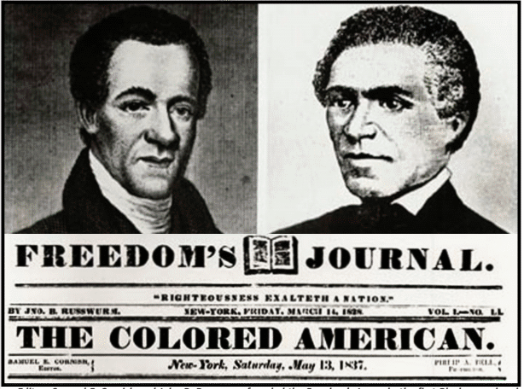“The Voices of Defiance: The Enduring Power of the Black Press”
- cebelihlehlatshway
- Nov 21, 2024
- 3 min read
How Free Black Men Used Media to Advocate for Civil Rights and Self-Representation
by Cebelihle Hlatshwayo
The origins of the Black press during slavery was a radical and purposeful act of resistance of black freedmen. They took on this cause, realizing that asserting their freedom was creating a platform for self-representation that advocated for civil rights and liberties for the black community in a world that denied them basic human rights. They understood the power of media in challenging racist systemic and systematic institutions that perpetuated white-dominated narratives to shape new ones and create unity through defiance to create empowerment, dignity, and equality.
Emancipation did not grant economic independence for Black people or a life free of discrimination. Freedom came at a cost. Free Black men seeking to establish newspapers faced immense challenges. Systemic racism and laws prohibiting literacy for enslaved people created a hostile environment for the dissemination of ideas. In the South, the mere act of writing and distributing these publications could lead to violent repercussions. Newspapers like Freedom’s Journal had to navigate these dangers, as many white Americans feared that Black literacy and communication could incite revolts, like Gabriel’s Rebellion in 1800.
In addition to economic barriers, societal expectations placed further limits on Black freedmen’s opportunities.. Emancipation did not guarantee economic freedom; many Black people, including freedmen, were impoverished and struggled to secure the resources needed to produce and distribute newspapers. This economic dependency further reinforced harmful stereotypes that Black people could not survive independently of white society, a narrative the Black press sought to dismantle.
The mutually beneficial relationship between the industrial North and the agricultural South made black freedmen constantly aware of the fragility of their recent freedom. Their recognition as freedmen from enslaved people did not extend to all Northern States. Thus, their freedom came with its conditions and expectations from white society. Expectations to assimilate into the culture of the time with gratitude, as they had been “granted” freedom.
This added to the dehumanization of the black population, as it highlighted that their rights were not inherent like white people but were subject to the whims of the dominant race. This was often seen in the prevalent practice of the kidnapping of freed Black men from the North to be sold off in the deep South or the continued practice of slavery in states like New Jersey and New Hampshire till after the end of the Civil War. This reality highlighted the power dynamic that existed between white and Black people and thus desecrated black emancipation.
These realities were why the Black press was greatly needed, as these realities would often go unreported or, worse, written for the entertainment and reinforcement of white supremacy. However, the reason for establishing the Black press, such as amplifying the needs, concerns, and grievances of the Black community, could not only make them targets but also incite a wave of hostility and uprisings for freedmen and still-enslaved Black people across the country.
Not being able to stop the creation of the Black Press, the dominant white press resorted to discrediting the Black press to combat its reach and influence. The New York Post and The New York Enquirer mocked and defamed African-American (Wilson, Gutiérrez, & Chao, 2013) journalists, intellectuals, and their culture. They did so as the black publications openly challenged the white publications’ racist and unethical journalism, which contributed to fueling the culture of racism among white Americans. This practice of discrediting the journalistic competency of black publications made it increasingly challenging to maintain credibility and reach sympathetic white audiences.
But, in contrast, it proved the black newspapers’ purpose, which was to discredit the falsehoods of the white publications, bring awareness to Black American issues, and empower and bring hope to the black community. Black freed people started to develop social networks in and around their communities, such as churches and societies that consisted of white abolitionists, educated Black people, and Black intellectuals, which not only provided a foundation for launching newspapers like Freedom’s Journal but also cultivated a Black community that could engage in communal life that encouraged black empowerment through education, and business.
This growing support system empowered freedmen in the North to start publications driven by a shared sense of purpose and urgency. The newspapers became platforms to document and critique the moral contradictions of American society, especially the hypocrisy of a nation that touted freedom while upholding slavery and also becoming the unofficial archive of black resistance.
In conclusion, Free Black men started the Black press because they understood the power of words to inspire change and challenge oppression. Their work wasn’t just about fighting the immediate injustices of slavery—it was about creating a lasting legacy of strength, advocacy, and empowerment. Despite the challenges they faced, their newspapers became powerful tools for resistance, brought communities together, and preserved stories of hope, showing that even in the hardest times, the written word could drive liberation.









Comments